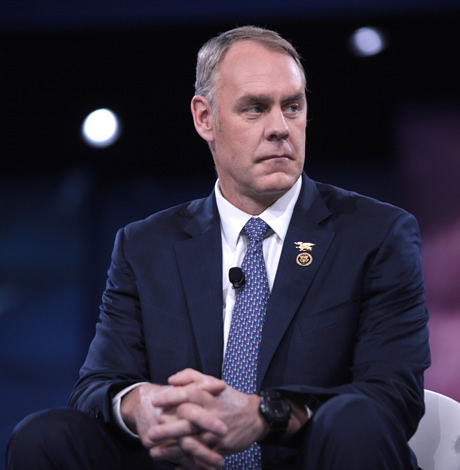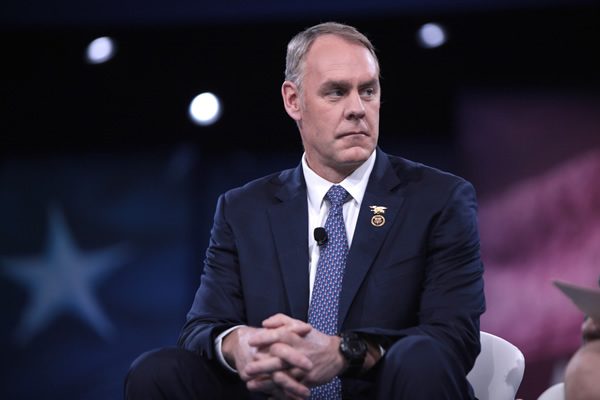News
GOP Montana congressman implies challenger a lesbian by choice
Rep. Zinke says he doesn’t mind ‘if you want to be a lesbian’

A Republican who represents Montana in the U.S. House told the lesbian Democrat challenging him for his seat he doesn’t mind “if you want to be a lesbian,” implying he believes being gay is a choice.
Rep. Ryan Zinke (R-Mont.) made the remarks Wednesday night during a debate in response to a question from an audience member about what the candidates would do to protect LGBT rights.
Denise Juneau, who’s gay, quipped the question was an “awesome” one for her. The way she would accomplish that goal: “Number one, get elected.”
Juneau, who’s currently Montana’s state superintendent of public instruction, also invoked the history of Montana, a state that elected a woman to Congress before women were guaranteed the right to vote in the United States, and her Native American heritage.
“We elected a woman before women had the right to vote,” Juneau said. “A century later it’s time for another woman to serve in congress. We also have never had an American Indian woman serve in Congress from anywhere in the country. That’s what can happen this election cycle when you elect me. We also have not ever had an openly gay federal candidate. Those are all bonuses when Montanans elect me, and representation matters.”
Based on her experience observing the state legislature, Juneau said “representation matters” because when different kinds of people are elected new policy is discussed and stereotypes are broken down.
“That’s what I’ve done as state superintendent – is made sure every student who steps through the doors of a public school, and this is the work of our local school boards across the state too, are safe, protected and have safe learning spaces,” Juneau said. “I’m an advocate for that and I’ll continue to be an advocate for all Montanans when I get elected.”
Zinke invoked the Constitution in his response and suggested he supports freedom of expression and religion.
“And so I do support you – if you want to be lesbian, you want to be Muslim, you want to be whatever,” Zinke said. “It doesn’t matter to me. It doesn’t matter. It doesn’t matter to me. And it doesn’t matter in Montana and it doesn’t really matter in this election because Montanans generally aren’t that way.”
The audience can be heard booing Zinke, although based on the audio it’s not clear if that’s for saying he supports the candidate or for erroneously implying being gay is choice.
“As a military officer it didn’t matter to me the religious or political affiliation of the person next to me,” Zinke continued. “What matters was the quality of the person – whether or not you were dedicated to the mission and whether you loved your country. That’s what matters in America and that’s what makes America so strong. Our diversity in message, our diversity in thought. But our unity as an American, because we are American first.”
Also on stage was libertarian candidate Rick Breckenridge, who said Juneau’s words means she would be welcome in his party, although “specialized rights” aren’t necessary.
“The freedom of expression that we’ve had in this country has been remarkable, and the way that we’ve accepted ideas foreign to maybe our upbringing has helped make us who we are today,” Breckenridge said. “So do we need a special law? No. The Constitution protects everybody’s rights equally, not specialized rights.”
Zinke’s views are reflected in his abysmal record on LGBT rights in Congress. In the Human Rights Campaign’s most recent congressional scorecard, which was issued Friday, Zinke scored “0.” Among other things, he didn’t vote in favor of amendments to protect President Obama’s executive order against anti-LGBT workplace discrimination and isn’t a co-sponsor of the Equality Act.
The U.S. House seat may be in play on Election Day. The Juneau campaign made public an internal Harstad Strategic Research poll this week finding her just three points behind Zinke. However, an internal survey from Moore Information made public by Zinke gave him a much wider 11-point lead in the race.
Brandon Lorenz, spokesperson for HRC, lambasted Zinke for his response.
“Ryan Zinke couldn’t be more disconnected from reality to make the offensive suggestion that being LGBTQ is a choice,” Lorenz said. “His comments are as out of touch as his voting record, given that he has repeatedly voted against protecting LGBTQ people from discrimination while in Congress.”
Kansas
ACLU sues Kansas over law invalidating trans residents’ IDs
A new Kansas bill requires transgender residents to have their driver’s licenses reflect their sex assigned at birth, invalidating current licenses.

Transgender people across Kansas received letters in the mail on Wednesday demanding the immediate surrender of their driver’s licenses following passage of one of the harshest transgender bathroom bans in the nation. Now the American Civil Liberties Union is filing a lawsuit to block the ban and protect transgender residents from what advocates describe as “sweeping” and “punitive” consequences.
Independent journalist Erin Reed broke the story Wednesday after lawmakers approved House Substitute for Senate Bill 244. In her reporting, Reed included a photo of the letter sent to transgender Kansans, requiring them to obtain a driver’s license that reflects their sex assigned at birth rather than the gender with which they identify.
According to the reporting, transgender Kansans must surrender their driver’s licenses and that their current credentials — regardless of expiration date — will be considered invalid upon the law’s publication. The move effectively nullifies previously issued identification documents, creating immediate uncertainty for those impacted.
House Substitute for Senate Bill 244 also stipulates that any transgender person caught driving without a valid license could face a class B misdemeanor, punishable by up to six months in jail and a $1,000 fine. That potential penalty adds a criminal dimension to what began as an administrative action. It also compounds the legal risks for transgender Kansans, as the state already requires county jails to house inmates according to sex assigned at birth — a policy that advocates say can place transgender detainees at heightened risk.
Beyond identification issues, SB 244 not only bans transgender people from using restrooms that match their gender identity in government buildings — including libraries, courthouses, state parks, hospitals, and interstate rest stops — with the possibility for criminal penalties, but also allows for what critics have described as a “bathroom bounty hunter” provision. The measure permits anyone who encounters a transgender person in a restroom — including potentially in private businesses — to sue them for large sums of money, dramatically expanding the scope of enforcement beyond government authorities.
The lawsuit challenging SB 244 was filed today in the District Court of Douglas County on behalf of anonymous plaintiffs Daniel Doe and Matthew Moe by the American Civil Liberties Union, the ACLU of Kansas, and Ballard Spahr LLP. The complaint argues that SB 244 violates the Kansas Constitution’s protections for personal autonomy, privacy, equality under the law, due process, and freedom of speech.
Additionally, the American Civil Liberties Union filed a temporary restraining order on behalf of the anonymous plaintiffs, arguing that the order — followed by a temporary injunction — is necessary to prevent the “irreparable harm” that would result from SB 244.
State Rep. Abi Boatman, a Wichita Democrat and the only transgender member of the Kansas Legislature, told the Kansas City Star on Wednesday that “persecution is the point.”
“This legislation is a direct attack on the dignity and humanity of transgender Kansans,” said Monica Bennett, legal director of the ACLU of Kansas. “It undermines our state’s strong constitutional protections against government overreach and persecution.”
“SB 244 is a cruel and craven threat to public safety all in the name of fostering fear, division, and paranoia,” said Harper Seldin, senior staff attorney for the ACLU’s LGBTQ & HIV Rights Project. “The invalidation of state-issued IDs threatens to out transgender people against their will every time they apply for a job, rent an apartment, or interact with police. Taken as a whole, SB 244 is a transparent attempt to deny transgender people autonomy over their own identities and push them out of public life altogether.”
“SB 244 presents a state-sanctioned attack on transgender people aimed at silencing, dehumanizing, and alienating Kansans whose gender identity does not conform to the state legislature’s preferences,” said Heather St. Clair, a Ballard Spahr litigator working on the case. “Ballard Spahr is committed to standing with the ACLU and the plaintiffs in fighting on behalf of transgender Kansans for a remedy against the injustices presented by SB 244, and is dedicated to protecting the constitutional rights jeopardized by this new law.”
National
After layoffs at Advocate, parent company acquires ‘Them’ from Conde Nast
Top editorial staff let go last week

Former staff members at the Advocate and Out magazines revealed that parent company Equalpride laid off a number of employees late last week.
Those let go included Advocate editor-in-chief Alex Cooper, Pride.com editor-in-chief Rachel Shatto, brand partnerships manager Erin Manley, community editor Marie-Adélina de la Ferriére, and Out magazine staff writers Moises Mendez and Bernardo Sim, according to a report in Hollywood Reporter.
Cooper, who joined the company in 2021, posted to social media that, “Few people have had the privilege of leading this legendary LGBTQ+ news outlet, and I’m deeply honored to have been one of them. To my team: thank you for the last four years. You’ve been the best. For those also affected today, please let me know how I can support you.”
The Advocate’s PR firm when reached by the Blade said it no longer represents the company. Emails to the Advocate went unanswered.
Equalpride on Friday announced it acquired “Them,” a digital LGBTQ outlet founded in 2017 by Conde Nast.
“Equalpride exists to elevate, celebrate and protect LGBTQ+ storytelling at scale,” Equalpride CEO Mark Berryhill said according to Hollywood Reporter. “By combining the strengths of our brands with this respected digital platform, we’re creating a unified ecosystem that delivers even more impact for our audiences, advertisers, and community partners.”
It’s not clear if “Them” staff would take over editorial responsibilities for the Advocate and Out.

In an official statement released at the reveal event Capital Pride Alliance described its just announced 2026 Pride theme of “Exist, Resist, Have the Audacity” as a “bold declaration affirming the presence, resilience, and courage of LGBTQ+ people around the world.”
The statement adds, “Grounded in the undeniable truth that our existence is not up for debate, this year’s theme calls on the community to live loudly and proudly, stand firm against injustice and erasure, and embody the collective strength that has always defined the LGBTQ+ community.”
In a reference to the impact of the hostile political climate, the statement says, “In a time when LGBTQ+ rights and history continue to face challenges, especially in our Nation’s Capital, where policy and public discourse shape the future of our country, together, we must ensure that our voices are visible, heard, and unapologetically centered.”
The statement also quotes Capital Pride Alliance CEO and President Ryan Bos’s message at the Reveal event: “This year’s theme is both a declaration and a demand,” Bos said. “Exist, Resist, Have Audacity! reflects the resilience of our community and our responsibility to protect the progress we’ve made. As we look toward our nation’s 250th anniversary, we affirm that LGBTQ+ people have always been and always will be part of the United States’s history, and we will continue shaping its future with strength and resolve,” he concluded.
-

 Mexico5 days ago
Mexico5 days agoUS Embassy in Mexico issues shelter in place order for Puerto Vallarta
-

 Netherlands4 days ago
Netherlands4 days agoRob Jetten becomes first gay Dutch prime minister
-

 Sports4 days ago
Sports4 days agoMore than a dozen LGBTQ athletes medal at Olympics
-

 Books3 days ago
Books3 days agoNew book profiles LGBTQ Ukrainians, documents war experiences




















